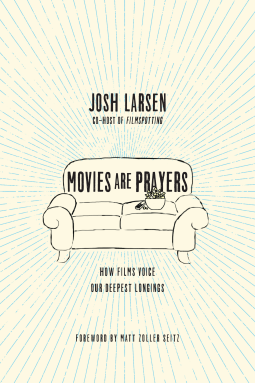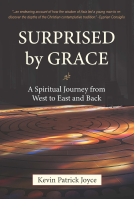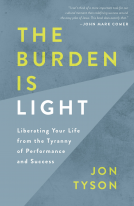
Movies Are Prayers
How Films Voice Our Deepest Longings
by Josh Larsen
This title was previously available on NetGalley and is now archived.
Send NetGalley books directly to your Kindle or Kindle app
1
To read on a Kindle or Kindle app, please add kindle@netgalley.com as an approved email address to receive files in your Amazon account. Click here for step-by-step instructions.
2
Also find your Kindle email address within your Amazon account, and enter it here.
Pub Date Jun 05 2017 | Archive Date Jul 07 2017
InterVarsity Press | IVP Books
Description
"Movies are our way of telling God what we think about this world and our place in it. . . . Movies can be many things: escapist experiences, historical artifacts, business ventures, and artistic expressions, to name a few. I'd like to suggest that they can also be prayers."
Movies do more than tell a good story. They are expressions of raw
emotion, naked vulnerability, and unbridled rage. They often function in
the same way as prayers, communicating our deepest longings and joys to
a God who hears each and every one.
In this captivating book, Filmspotting co-host Josh Larsen brings a critic's unique perspective to how movies function as expressions to God of lament, praise, joy, confession, and more. His clear expertise and passion for the art of film, along with his thoughtful reflections on the nature of prayer, will bring you a better understanding of both.
God's omnipresence means that you can find him whether you're sitting on your sofa at home or in the seats at the theater. You can talk to him wherever movies are shown. And when words fail, the perfect film might be just what you need to jump-start your conversations with the Almighty.
Advance Praise
"Going far beyond a simple assessment of Christlike martyr figures (the movies are lousy with 'em), Josh Larsen's passionate and movingly reflective new book makes an inspiring case for treating a provocative variety of films as prayers for all seasons. He writes on everything from Terrence Malick's The Tree of Life to Michael Haneke's Amour, teasing out the filmmakers' insatiable desire to wrestle with the unknowable. But his democratically theological approach to the medium he loves brings into play unexpected gems: Polanski's Chinatown, or Demme's The Silence of the Lambs (to which Larsen took his future wife on a date). 'Many films,' he writes, 'even the challenging ones, are capable of functioning as messy, mixed-up, miraculous prayer.' I've long been engaged by Larsen's film criticism on Filmspotting, but his book seeks and finds a higher power and a more mysterious set of concerns, somewhere out past the lobby."
—Michael Phillips, Chicago Tribune
"This is one of the best books on film and theology I've ever read. By conceiving of and engaging with movies as 'prayerful gestures received by God," Larsen guides the reader in a study that is itself a reverent, prayerful gesture. Packed with insights into how both the content and the form of films can mirror prayer, Movies Are Prayers is a must-read for anyone who has ever felt the pangs of transcendence in a movie theater. Yet this is a book as much about prayer as it is about pop culture. Readers will gain not only new language with which to understand movies, but an enlivened paradigm for understanding prayer."
—Brett McCracken, film critic for Christianity Today, author of Gray Matters and Hipster Christianity
"There's a lot of writing on film and theology, but a perspective like Larsen's—fresh, insightful, and interesting for anyone—is a rare gift to cinephiles and more casual movie viewers alike. In Movies Are Prayers, Larsen encourages us to rethink movies as not just vehicles for content, but as actual expressions of the heart's deepest longings, readjusting the way we think about both films and their creators—and, by extension, ourselves as viewers and critics."
—Alissa Wilkinson, film critic, Vox.com, associate professor of English and humanities, The King's College
"I'm about as far removed from religion and spirituality as one could possibly be, and yet Movies Are Prayers opened up for me an entirely new way of appreciating the movies I love and the art of filmmaking as a whole. As Larsen points out, it's so easy for even the most obsessive cinephiles among us to fall back on viewing cinema through the cynical lens of commercialization or a frothy lens of mere escapist entertainment. By reexamining an array of movies, including the ostensibly secular (Trainwreck, The Muppets), via the language of prayer, this engagement with the medium uncovers a different and fascinating approach to film theory."
—Aisha Harris, Slate culture writer, editor, and host of the podcast Represent
Available Editions
| EDITION | Paperback |
| ISBN | 9780830844784 |
| PRICE | $16.00 (USD) |
| PAGES | 208 |
Featured Reviews
 Robert M, Educator
Robert M, Educator
Standard disclaimer. I got an advanced copy of the book from NetGalley in exchange for an honest review. I would like to thank them and IVP books for the ability to be able to read it in advance.
I wanted to read this book because I think of myself as a bit of a movie person. Another reason was that my church (life.church) does a series each July called At The Movies where our Pastor takes clips from movies and builds a sermon about them. I expected a kind of insight that Pastor Craig Groeschel gives in the movies. Well, I am not as much of a movie person as I thought I was, and the insight given was not like my pastor's at all. This last fact is not a horrible thing. It is just that they have two different ways of looking at things and I was not expecting the difference.
The book made me want to look into some of the movies mentioned in the book. In fact, it may be worth picking up just for the lost of movies from the book listed in the appendix at the end.
Each chapter starts with a view of a type of prayer and talks about how a particular shows that type of prayer so that we can get an understanding of what he means. For the most part, these movies are relatively well known so as to help us by giving us something familiar. From there he shows us written clips from other movies, here they may be a little bit more obscure, to give us clearer details of the idea, and then rounds it up with going back to the into film to wrap things up.
One of the things that I did a lot of was looking up films to watch later as I read the chapters. The way a silent movie was talked about made me want to rent it right away and watch it. Even though I did find it on an online service to rent I did hold off as there were many other good ones mentioned as well.
I have read many books on the types of prayers that exist. As usually no two books reflect the same list of prayers, and this book did not disappoint in that respect, his list is different also. What was interesting is the way that he weaved these prayers in a story. It is a well know story of creation, then the fall. Followed by redemption and then restoration. Each of the type of prayers follows in those categories. Creation: praise. Fall: yearning, lament, anger. Redemption: confession, reconciliation, meditation/contemplation. Restoration: joy. In the end, the last chapter shows you them all in one movie as a journey.
My only complaint was chapter length. While I did not go back and see if they were evenly spaced out (I suspect they were), there seemed to be some chapters that I wanted to go on longer and felt they were cut short. Other chapters I felt went on much longer that they needed to. This is most likely my fault and not the authors. It is just where I was at when I read those chapters I think.
Recommended for Christian friends and those of my friends who are not antagonistic to the faith and also like movies. I look forward to any books this author may put out in the future.
 Conrade Y, Reviewer
Conrade Y, Reviewer
According to the Motion Picture Association of America, global box office revenue for films released in 2016 reached $38.6 billion and $11.4 billion in US/Canada markets. The numbers continue to grow especially with the rising popularity of online streaming mechanisms and more affordable data plans. Movies too are increasingly being used as a platform for self-expression and a general reflection of cultural nuances. Author Josh Larsen believes that movies are actually prayers in disguise. This may seem surprising for some people. After all, aren't prayers something religious that are covered only in Christian films or Church-based activities? How can movies in secular society be considered prayers? The key belief is that underneath the various movies expressions, if we look carefully enough, we can find the deep yearnings of the human heart expressed in various aspects of the movie. By combining film criticism and theological reflection, we get what Larsen calls: "Movies are Prayers."
Without ignoring the profit-making nature of movie making, the hype that surrounds huge stars, and the rotten tomato ratings, Larsen helps us probe inside, dig deep, float up, and reveals how movies contain many different forms of prayers. Taking a leaf from the psalms, prayers are essentially the different expressions of the human longing for a relationship with the divine. No matter how we may try to hide it, prayers are something so natural in us that they will come out of us sooner or later in life. In this book, we learn about how movies are increasingly popular platforms to bare the longings of the human soul. We learn of nine different such longings:
Prayers as Praise
Prayers of Yearning
Prayers of Lament
Prayers of Anger
Prayers of Confession
Prayers of Reconciliation
Prayers of Obedience
Prayers of Meditation and Contemplation
Prayers as Journey
In each chapter, Larsen outlines the meaning of the expression, followed by some biblical examples of how such acts are played out in movies. Constantly bringing us back to the notion of creation and behaviour of created beings, we get to see the nuances of prayers being explained through the plots, stories, acts, and artistic moves in the movies. For examples, there are prayers of praise expressed in movies such as Avatar, where the characters show forth their awe and appreciation for creation. He then gives us a way forward to see how the movies function in each of the nine longings. As Larsen explains the way movies are prayers, he also expounds on biblical teachings with regard to the scenes in the movies. There is a lot of applications of timeless truth. Even the way camera angles zoom in and out manifest meaning for interpretation.
I appreciate how Larsen weaves in many teachings about prayer making the use of movies an interesting pedagogical tool. Praise as yearning shows us our human need for divine relationship. Though movies tend to limit such expressions in a secular or agnostic manner, they cannot hide the nature of people to want to worship something or someone. "Solaris" and "Close Encounters of Third Kind" verbalize out loud our sense of wonder about the universe. "12 Years a Slave" give us reasons to be angry at injustice. The Confession motif is strong in movies like "Toy Story" and parts of "Platoon." There is the need for reconciliation as human people shown in films such as "Do the Right Thing," "The Interrupters," and "Brave." The stories of "It's a Wonderful Life" show us the rewards of plain obedience. He makes an important observation about horror movies, that often, such movies carry with them a moral bearing, for evil comes about due to some injustice and cruelty in the plot. If there is any genre most explicitly religious, it would be chapter 9 when Larsen writes about prayers as meditation and contemplation. By pointing viewers to think about a world larger than ours, we have moments to ponder about philosophy, morality, and theology.
Let me offer three thoughts about this book. First, it educates us about prayers. With the help from the writings and wisdom of Eugene Peterson, Henri Nouwen, the Philokalia, Richard Foster, Saint Ignatius, Thomas Merton, Teresa of Avila, and any other authorities, Larsen expands our understanding of prayer beyond just prayer requests or intercessions. The central purpose of prayer is about relationships, and all of these prayer expressions are essentially coming to God just as we are. Second, we learn to analyze all movies from a biblical and spiritual mindset. Instead of seeing movies merely as entertainment mediums, we can see with eyes of understanding and wondering what the director is trying to achieve. While we may not become professional critics or expert analysts, we do pick up additional lenses to watch movies. Indeed, after reading this book, watching movies will never be the same again. Finally, we see how Larsen brilliantly integrates culture, theology, contemporary issues, and many human longings together. If Mortimer Adler could teach us how to read a book, and how the Dummy series of books are able to teach us the basic how-to knowledge of various subjects, this book helps us to see the world of movies not only from a Christian perspective but also with much human appreciation. Above all, we are lifted above passive movie goers to active cultural observers. Better still, we grow in learning to see the world around us from a theological angle. Perhaps, just by reading this book, we would even want to to go on a movie binge watch! I believe that Larsen is on to something important. If we think of the Bible as the Story of stories, movies are subsets of the greatest story of all, expressed in contemporary and cultural symbols. That is why Larsen's book is so compelling.
Joshua Larsen is a co-host of the podcast Filmspotting and a film critic at Think Christian. He lives in Chicago with his wife and two daughters. His website is LarsenOnFilm.com where the public can view his works and interpretations on more movies.
Rating: 4.75 stars of 5.
conrade
This book has been provided courtesy of Inter-Varsity Press and NetGalley without requiring a positive review. All opinions offered above are mine unless otherwise stated or implied.
I've been looking for relatable devotionals, I am not anyone's wife, or mother, and I find that a lot of the devotionals for women center around these things. This is not geared specifically towards women, nor is it a devotional, but the chapters are broken up enough so that I can read one a day until I've finished, and if it's one thing I can relate to, it's movies. I was surprised at how Lrasen was able to tie some of the most familiar moves of my life to faith and living a Godly life. How there are Christian themes reflected in these plots, and or how many of the creators were Christians. I'd definitely recommend it if you are looking at ways to shake up your faith practice. I enjoyed it.















